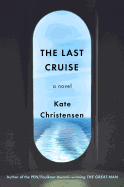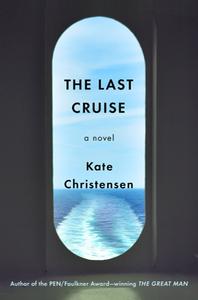
 It may come as no surprise that Kate Christensen, food blogger and author of the gastronomy memoir Blue Plate Special, sets her seventh novel, The Last Cruise, in a galley aboard the 1950s cruise ship Queen Isabella. Her story, however, is more about the personal aspirations and doubts of the cultured characters thrown together for a two-week cruise than it is about cuisine. This fits in line with her Pen/Faulkner Award-winner The Great Man, as well as The Astral and The Epicure's Lament, which feature poets and artists searching for connection.
It may come as no surprise that Kate Christensen, food blogger and author of the gastronomy memoir Blue Plate Special, sets her seventh novel, The Last Cruise, in a galley aboard the 1950s cruise ship Queen Isabella. Her story, however, is more about the personal aspirations and doubts of the cultured characters thrown together for a two-week cruise than it is about cuisine. This fits in line with her Pen/Faulkner Award-winner The Great Man, as well as The Astral and The Epicure's Lament, which feature poets and artists searching for connection.The pampered guests on the Isabella's one-off round-trip voyage to Hawaii gather for embarkation in Long Beach, Calif. Among them is a geriatric Israeli string quartet of Six-Day War veterans, including violinist Miriam. In her 70s, Miriam is still feisty enough to have a crush on the group's recent widower cellist--and prepared to act on it during their carefree cruise.
On a work/play junket, 34-year-old Maine farmer Christine agrees to accompany her New York City friend Valerie, a webzine editor doing a story on the world's working class--not Barbara Ehrenreich, she tells Christine, "the Studs Terkel thing instead." Valerie plans to drink and schmooze her way through the rank and file while Christine enjoys a break from farm drudgery to dress for dinner and read from the shipboard library's collection of classic Waugh, Wharton and Wodehouse.
The ship's Hungarian sous-chef, Mick, oversees the fresh produce and luxury meat cuts stowed to satisfy a vintage menu heralding '50s decadence ("fancy food and drink, back before farm-to-table became an elitist idea claimed by the rich instead of what peasants ate"). He and the largely immigrant coterie of workers berthed on the lower decks are charged with providing the upper deck hoity-toity a retro experience, including (in addition to the tartares and squabs) straight-up cocktails, live jazz and classical music, black-tie socials and unprohibited smoking. After the cruise, however, the crew are all being sacked as the global corporate owner of the Isabella plans to send it to the scrapyard.
Like many novels of isolated microcosmic societies, The Last Cruise slips from a romantic storybook idyll to a struggle between haves and have nots. The Isabella's disgruntled crew walks off the job and occupies a tent city on one of the guest decks. A fire breaks out in the engine room, setting the disabled ship adrift. Without power, toilets stop functioning just as a norovirus begins its deadly spread. Lobster Thermidor gives way to canned kidney beans and chopped Spam until helicopters drop rudimentary supplies of peanut butter, power bars and dried fruit. Crew and passengers alike "hover between anxious waiting, festering outrage, and a collective paralysis of will." Then, in a stunning denouement, a savage storm rocks the crippled ship. Christensen delivers another engrossing tale rich in character and social mores that reveals the fragile veneer of civilization. --Bruce Jacobs, founding partner, Watermark Books & Cafe, Wichita, Kan.
Shelf Talker: Gathered for a carefree vintage voyage to Hawaii, the cultured mix of guests and polyglot crew in The Last Cruise find that sailing into the past doesn't leave the troubled present behind.

